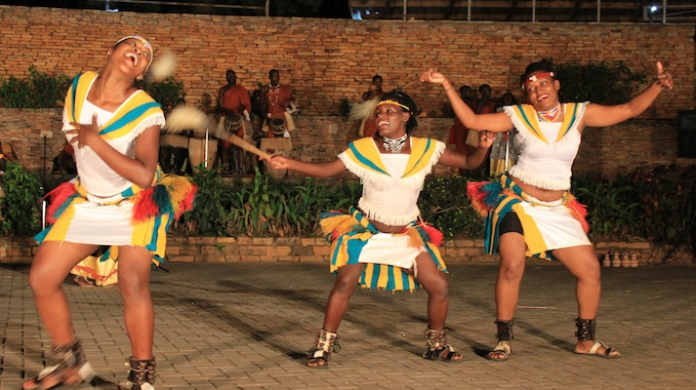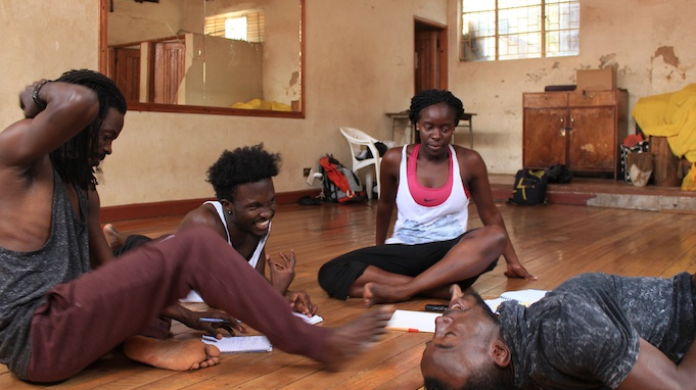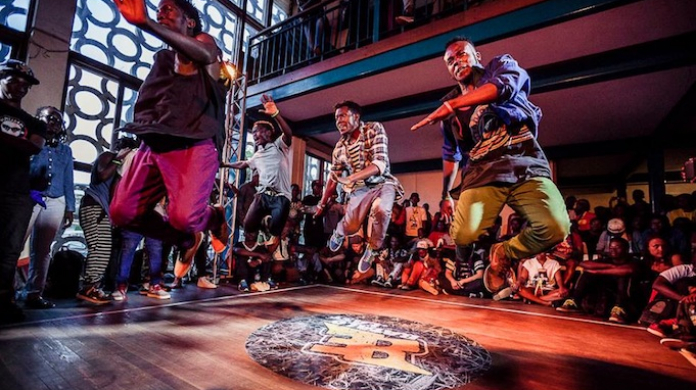Rachael Nanyonjo received an AIDF grant to travel to Uganda. She shares some observations from her trip.
Outside your comfort zone
As a student, I did my dissertation on hip-hop, dance, culture and capitalism. At this time, while delving deeper into the roots of African American vernacular dance, I became aware of the lack of visual documentation on dances from Africa – specifically Uganda, where my family is from.
I wanted to investigate this, and in 2014 I connected through with Tabuflo, a hip-hop dance theatre company from Uganda, at The Association of Dance of the African Diaspora’s (ADAD) conference. As soon as I met the company there was a clear connection creatively: we both are passionate about storytelling using theatre, dance and music. But the company was also very active within the Ugandan dance scene, specifically in Kampala, and had a focus on bridging the gap between traditional and urban dances. I was supported by Abdul Kinyenga (Artistic Director of Tabuflo) and my mentor Steven Brett to apply to the Artists’ International Development Fund.
I was in Uganda for an incredible four weeks in August 2015. During this time, my partners were Tabuflo, Ndere Dance Troupe and Mackerere University. I did a series of interviews and documented traditional dances of Uganda through attending professional performances at Ndere Centre and classes at the national theatre and local studios, and observing local artists’ rehearsals. I also had the chance to work with Tabuflo in the studio where we exchanged and shared choreographic practices.
One highlight of the trip was participating in the week-long Batalo East and Break Anatomy Training Programme and festival. The programme delivered a number of professional dance classes, seminars and lecture debates to dancers from East Africa. The philosophy of the programme was to develop dance artists beyond the studio – focusing on their teaching skills and business skills.
There was also a focus on learning traditional forms. I taught a contemporary workshop, and it was very rewarding to be able to share my knowledge with dancers from diverse backgrounds who may not have practiced these styles. This was learning curve in developing my teaching methods for international artists, due to the language barrier. However, it made me aware of the need to be clear in my expressions and teaching. It was rewarding to see how the dancers took what they learnt and made it their own. I also delivered contemporary workshops each week to young dancers at a popular dance studio called In Movement.
The trip was very humbling, as it taught me about the politics, history and culture of Uganda. This last is deeply embedded in dance and music. This gave me a whole new appreciation of the dances and teachers.
Returning to London, I feel I have now been challenged to not make work that sits within my comfort zone but to be bold and experiment more. My ideas and views on sustainability as an artist have changed, having observed the innovative ways artists fund themselves – there is not much arts funding in Uganda.
I learnt that a lot of the issue we face as dance/theatre artists in the UK are the same – to a certain extent – in Uganda, but just on different levels. However, in Kampala, great studio facilities are rare. Working with Tabuflo, I noticed that we begin our process in the same way: we start from a concept, talk it out structurally and then begin to physically play with some ideas that have been discussed.
As a result of this trip, I was awarded the ADAD Trailblazer Fellowship to create a docu-series from the footage of this trip. I shall write a paper to be published and presented at Re-Generations 2016. I hope to return to Uganda next year to work on the Batalo Festival and possibly present work. I am in the process of creating an installation dance theatre work based on some of the themes of this project. A 10-15 minute scratch of this will be shown at the Trailblazers Showcase at The Place in May next year.
Rachael Nanyonjo travelled to Uganda with the support of the Artists International Development Fund, jointly run by Arts Council England and the British Council. More information can be found on the AIDF website.


